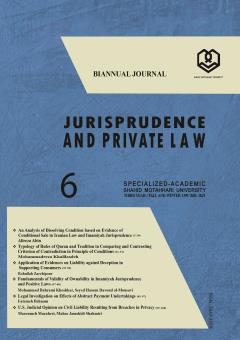-
-
-
Open Access Article
1 - Jurisprudential and Legal Study of Provisos after Cancellation
Seyed Mohammad Hadi Saei Maryam SaqafiCancellation is reached when both parties have consent over the termination of the contract. This means the end of the contract effects and the resulting commitments. This, however, relates to the future; therefore, it is not like nullification of the contract. It does MoreCancellation is reached when both parties have consent over the termination of the contract. This means the end of the contract effects and the resulting commitments. This, however, relates to the future; therefore, it is not like nullification of the contract. It does not have retrospective impact, and consequently it does not affect the pre-cancellation consequences. This point has been neglected by some and in their explanation of rules regarding provisos after cancellation they maintain that all conditions are nullified including attributes, performance and collateral events. Pursuant to this, the Civil Code in Article 246 stipulates that when a contract is terminated by mutual consent, its terms become null and void, whereas rules regarding and effects of each proviso are different and Article 246 shall not be attributable to all of them. This means that the condition of attribute is not within the prerogative of the said article and hence it is not nullified, but also it returns to the initial owner according to the subject of transaction. The condition of collateral events, due to its certain characteristics, is realized immediately after the conclusion of the contract, thus it cannot be nullified or waived either. In the meantime, only the condition of performance, either negative or positive, is nullified due to cancellation although it leaves behind consequences that are analyzable. Manuscript profile
List of Articles Maryam Saqafi
-
The rights to this website are owned by the Raimag Press Management System.
Copyright © 2017-2024


